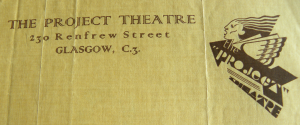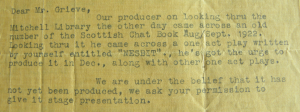II – IN THE HUGH MACDIARMID COLLECTION…: MS LETTER FROM THE PROJECT THEATRE, GLASGOW… NEW PLAYS ‘PROJECT’ NEW IDEAS

Letter-head from a letter to Christopher Grieve (Hugh MacDiarmid) from the Project Theatre, Glasgow, 1932
Among the many letters to Hugh MacDiarmid from producers and directors of theatre companies across the UK and Europe, and from editors of journals and reviews, is a couple of pieces of correspondence from the Director of the Project Theatre, Glasgow.
Writing on 9 November 1932, the Director, Frederic Grant, mentions that the Theatre producer had found an old number of the Scottish Chapbook (August/September 1922) in the Mitchell Library. On looking through it he came across a one act play written by Grieve entitled Nisbet, He now had ‘the urge to produce’ the play the next month – December – ‘along with other one act plays’. Grant was ‘under the belief’ that they play had ‘not yet been produced’ and requested Grieve’s ‘permission to give it stage presentation’.

Body of the letter from Frederic Grant to Christopher Grieve, 9 November 1932, asking permission to put on ‘Nisbet’.
The play in question was Nisbet, An Interlude in Post War Glasgow which had been published in 1922 in two issues of the Scottish Chapbook which had become an important outlet for his writing. The Nisbet in question was John Bogue Nisbet a young poet friend of Grieve who was killed at Loos during the First World War. The two used to go cycling and camping in Berwickshire and elsewhere.
Grant’s letter continues: ‘In accordance with our rules we do not pay authors for performing their plays when it is a case of first time on any stage. Our organisation has been founded for various reasons, one outstanding feature is our desire to help playwrights to have their work presented to the public’.
A second letter from the Project Theatre on 3 January 1933 announces that Nisbet had ‘jumped its first hurdle’. Grant continues: ‘I didn’t think for one moment you ever expected it to be played. Some of the passages came out very well indeed, but as you may agree there was a lack of theatre. Nevertheless the experiment was interesting’.
Grant then describes how the Theatre workshop had created a back-cloth ‘in symbolic design, depicting piles of tenements and everything that is loathsome of Glasgow’. he also refers to the review in the Daily Record the morning after (probably 24 December 1932) in which the play was described as a ‘Cerebral Puzzle’.
Nevertheless, the Director of the Project Theatre was keen to know if Grieve had ‘any more to offer us?’ The Theatre was ‘intent upon doing new plays whenever possible. What a wealth of expression our present time affords’.
The Project Theatre liked to ‘be not too tame neither’ !
Dr. Graeme D. Eddie, Assistant Librarian Archives & Manuscripts, Centre for Research Collections
![]() This piece was written using: (1) Correspondence within the MacDiarmid collection, Ms. 2966; (2) Lucky Poet. A self-study in literature and political ideas, p.83 London: Jonathan Cape, 1972. In Library general collections – PR 6013. R735 Macd; (3) ‘Hugh MacDiarmid, Author and Publisher’, J. T. D. Hall, in Studies in Scottish Literature, Vol. 21. Issue 1. January 1986
This piece was written using: (1) Correspondence within the MacDiarmid collection, Ms. 2966; (2) Lucky Poet. A self-study in literature and political ideas, p.83 London: Jonathan Cape, 1972. In Library general collections – PR 6013. R735 Macd; (3) ‘Hugh MacDiarmid, Author and Publisher’, J. T. D. Hall, in Studies in Scottish Literature, Vol. 21. Issue 1. January 1986

